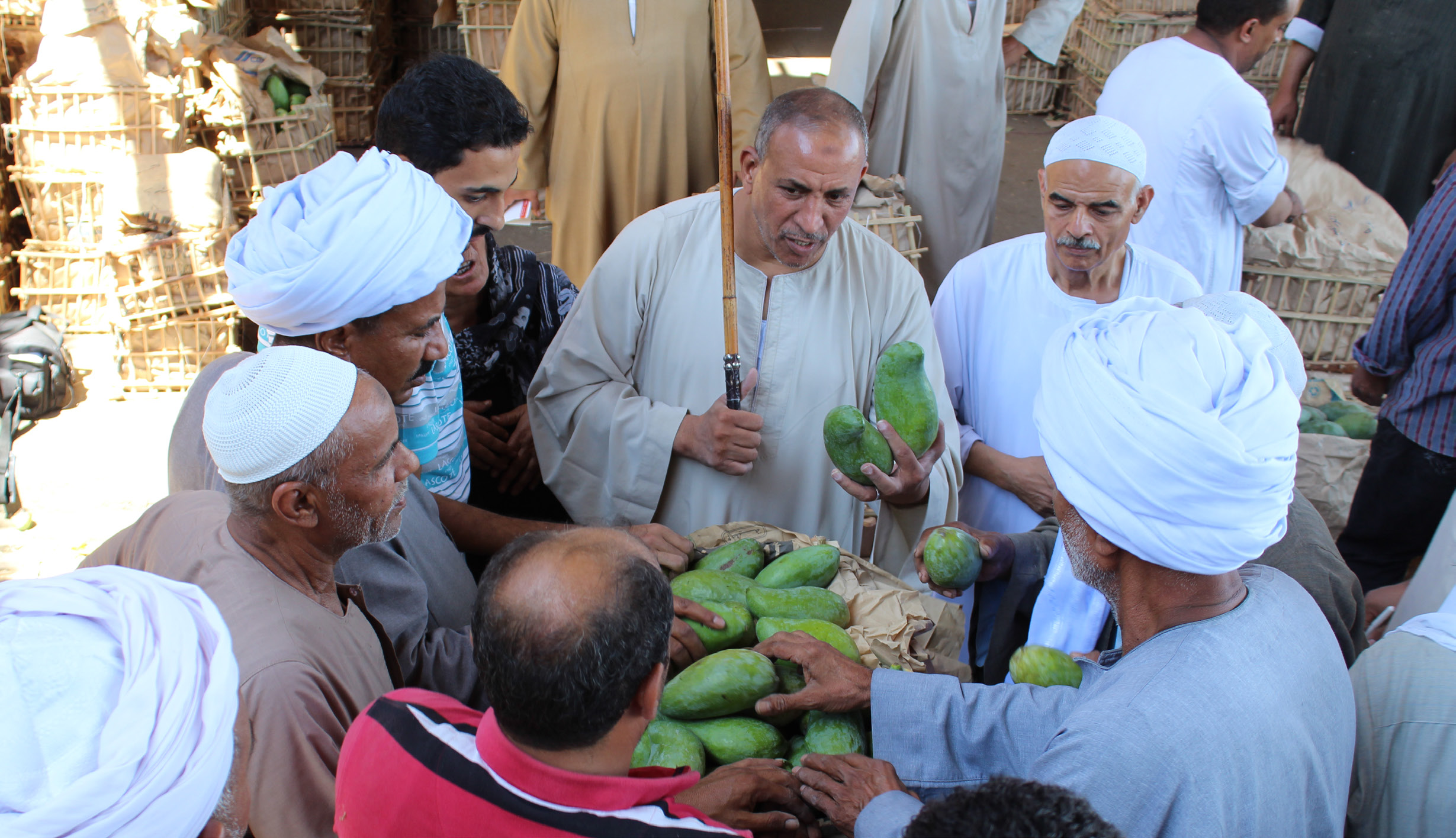Linking Mango Farmers to New Markets in Egypt
A turquoise blue pickup truck pulls into Al Obour Market, carrying crate on crate of ripe mangoes stacked in the truck bed. It’s the crack of dawn, and the energy at Al Obour, one of the largest fruit and vegetable markets in Cairo, Egypt, begins to shift from the stillness that takes hold for only a few hours overnight to bustling activity at first sight of light as farmers and buyers congregate to make deals on grapes, watermelon, tomatoes, or any other produce. Simultaneously, a group of nine farmers open the door of their white van and step onto the sidewalk of the market, sleep still at the corners of their eyes.
These farmers made the 14-hour drive from Aswan with the support of the Feed the Future Egypt Food Security and Agribusiness Support (FAS) project, which aims to increase the incomes and improve food security for at least 14,000 Upper Egyptian smallholder farmers, to connect with buyers that could potentially offer higher prices than the local market in Aswan. This day did not occur in isolation but was instead the product of months of training and preparation for these farmers.
As one of the largest markets in Cairo, the buyers at Al Obour Market will not purchase just any mangoes. Instead, they seek out quality mangoes, perfectly ripe and free of bruising. The farmers in Aswan originally struggled with post-harvest losses and producing high-quality mangoes that could earn higher prices. Part of the problem came from lack of access to inputs, whereas others revolved around harvesting techniques, such as when farmers shook the trees until the mangoes fell to the ground. In order to address these issues, the FAS harvest and post-harvest team conducted on-farm trainings for 49 mango farmers in Aswan. The four-day training introduced participating farmers to new harvesting techniques in order to retain the quality and reduce damage to the mangoes during harvest. For example, the FAS team designed a new tool that enabled farmers to pick the mangoes directly from the tree, keeping the fruit fresh and free from bruising. Attending mango farmers also learned about the importance of sorting and packing the mango fruits in carton boxes, which helps retain the high quality of the fruit, resulting in higher prices for farmers.
But the training didn’t just stop once the mangoes were properly picked and packed. The FAS project also aims to improve farmers and producer organizations’ marketing of agricultural crops, ultimately allowing farmers to reap higher profits. The Aswan mango farmers previously sold to middlemen before the fruit had matured for a low price in order to get fast cash to pay off agricultural expenses. The FAS marketing team conducted extensive training with farmers in marketing and negotiation to give farmers the knowledge and confidence to connect directly with buyers. The project also encouraged farmers to come together and sell to other farmers in order to gain bargaining power.
Usama Abdel Rahman, a FAS marketing officer from Aswan, played a key role in training farmers in the negotiation skills that would be utilized in Al Obour Market. “The trainings were very interactive. We would use scripts and role play to give farmers firsthand experience in negotiation,” he said.
So, when the day came for the farmers to meet with the buyers, they were well prepared. Farmers represented nine agriculture associations in Aswan and brought along with them a 1.5-ton sample of their mangoes. As a group, the farmers walked around the market and sat down more than a few times with buyers to talk logistics and numbers. Ultimately, all nine of the farmers made their sale to Haj Adly Abdel Gabbar of Al Itehad Company. Whereas these farmers, on average, sell their mangoes for $0.35 (6 LE) per kilo in the Aswan market, this trader facilitated selling the mangoes at $0.67 (11.5 LE) per kilo, nearly doubling the price. Haj Abdel Gabbar was clear that the farmers weren’t the only ones who benefited, as he received a 10% commission for facilitating such a purchase.
“I am also happy because I get to deal with the farmers directly and these mangoes here are very good quality. This will result in increasing the profit margin for farmers, which will improve their economic status, which reflects positively on the economic development of the country,” he said.
This day stood as a testament to the tangible knowledge and skills these farmers have acquired through the FAS project and their ability to utilize these skills to connect with new markets and sell their produce at higher prices. Although a small step, these farmers left Al Obour market, making it known that Aswan has the potential to become a reliable source of quality mango.


